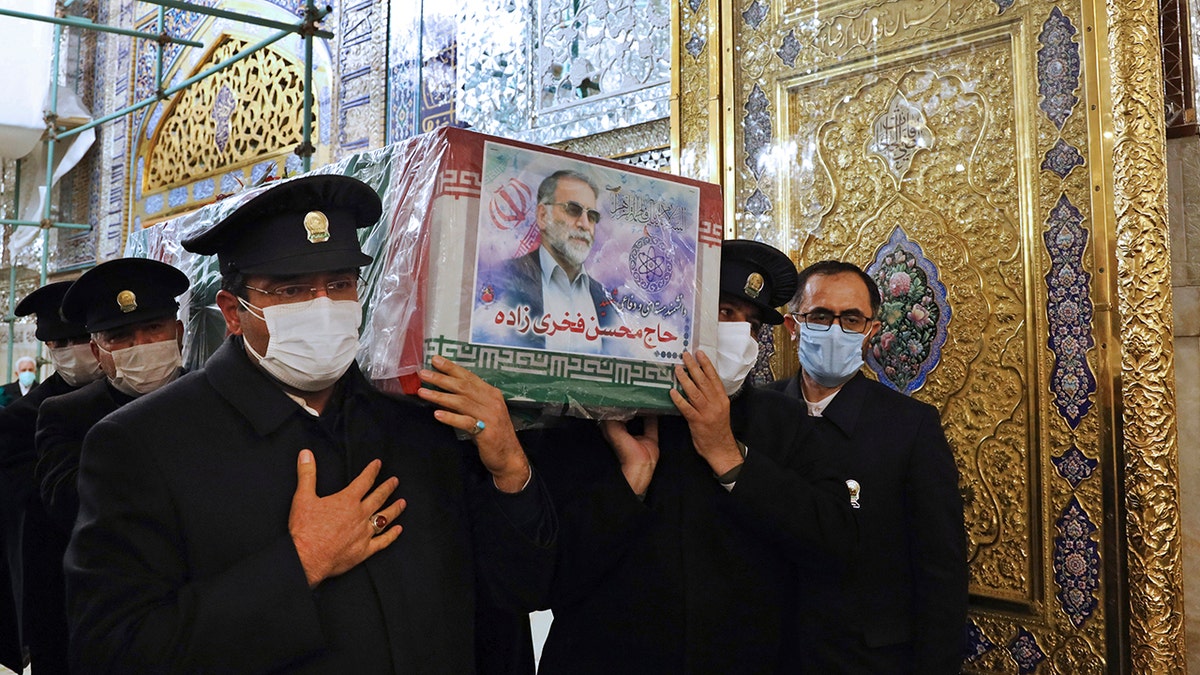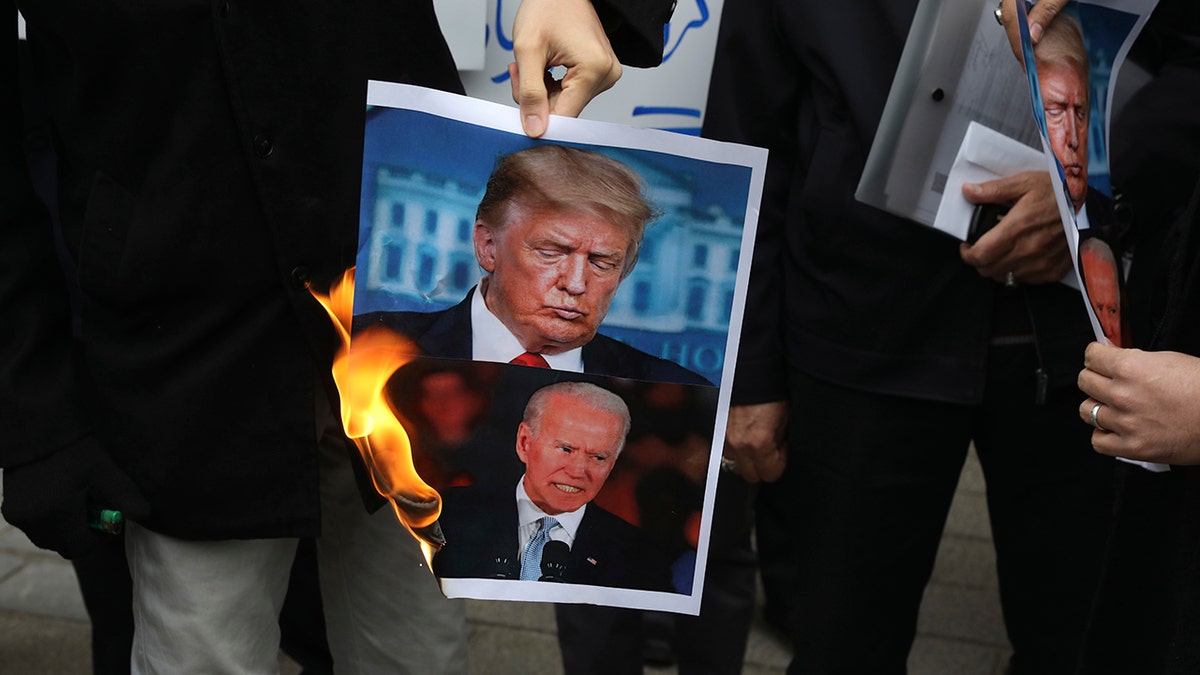Iran's leader threatens retaliation over killing of top nuclear scientist
Officials in Iran are plotting its response after scientist Mohsen Fakhrizadeh was killed. Trey Yingst reports.
Iran is plotting a “calculated and decisive” response to the assassination of its top nuclear scientist, according to an adviser to the country’s supreme leader, as calls for a retaliatory attack escalate.
An opinion piece published in a hard-line newspaper suggested that Iran attack the port city of Haifa, causing “heavy human casualities,” if Israel carried out the killing.
“Undoubtedly, Iran will give a calculated and decisive answer to the criminals who took Martyr Mohsen Fakhrizadeh from the Iranian nation,” Kamal Kharrazi, the adviser who also leads Iran’s Strategic Council on Foreign Relations, said in a statement, according to Reuters.
Fakhrizadeh, who founded the Islamic Republic’s military nuclear program in the early 2000s, was killed in a military-style ambush Friday in the outskirts of Tehran when a truck bomb exploded and gunmen opened fire.
IRAN'S SUPREME LEADER VOWS REVENGE OVER SLAIN SCIENTIST
Israel has not commented on the attack, but Iran’s clerical and military rulers claim the Jewish state is responsible, pointing to a string of killings of other Iranian nuclear scientists over the past decade.

In this picture released by the Iranian Defense Ministry and taken on Saturday, Nov. 28, 2020, caretakers from the Imam Reza holy shrine, carry the flag-draped coffin of Mohsen Fakhrizadeh, an Iranian scientist linked to the country's disbanded military nuclear program, who was killed on Friday, during a funeral ceremony in the northeastern city of Mashhad, Iran. (Iranian Defense Ministry via AP)
The opinion piece written by Iranian analyst Sadollah Zarei and published Sunday in the Kayhan daily argued Iran's previous responses to suspected Israeli airstrikes that killed Revolutionary Guard forces in Syria did not go far enough to deter Israel.
Zarei said Iran should retaliate with an attack on Haifa that destroys a large number of facilities and "also causes heavy human casualties.”
Striking Haifa, which sits on the Mediterranean Sea, and killing a large number of people “will definitely lead to deterrence, because the United States and the Israeli regime and its agents are by no means ready to take part in a war and a military confrontation,” Zarei wrote.
He said an assault on Haifa needed to be greater than Iran’s ballistic missile attack against American troops in Iraq following the U.S. drone strike in Baghdad that killed top Iranian general Qasem Soleimani in January.
Kayhan is a small circulation newspaper, but editor-in-chief Hossein Shariatmadari was appointed by Supreme Leader Ayatollah Ali Khamenei and has been described as an adviser to him in the past. Haifa has been threatened in the past by both Iran and one of its proxies, the Lebanese militant group Hezbollah.
Iran's 290-seat parliament on Sunday held a closed-door hearing about Fakhrizadeh's killing. Afterward, parliament speaker, Mohammad Baqer Ghalibaf, said Iran's enemies must be made to regret killing him.
WOMAN FREED IN IRAN HOSTAGE SWAP ORIGINALLY ARRESTED FOR DATING ISRAELI: REPORT
“The criminal enemy does not regret it except with a strong reaction,” he said in a broadcast on Iranian state radio. A public session of lawmakers saw them chant: “Death to America!" and "Death to Israel!”

A group of protesters burn pictures of the U.S. President Donald Trump, top, and the President-elect Joe Biden in a gathering in front of Iranian Foreign Ministry on Saturday, Nov. 28, 2020, a day after the killing of Mohsen Fakhrizadeh an Iranian scientist linked to the country's nuclear program by unknown assailants near Tehran. (AP Photo/Vahid Salemi)
They also began the review of a bill that would stop inspections by the International Atomic Energy Agency. The nuclear watchdog provided an unprecedented, real-time look at Iran’s civilian nuclear program following the country's 2015 nuclear deal with world powers.
The deal has unraveled after President Trump’s unilateral 2018 withdrawal of the U.S. from the accord. Iran’s civilian atomic program has since continued its experiments and now enriches a growing uranium stockpile up to 4.5% purity. That’s still far below weapons-grade levels of 90%, though experts warn Iran now has enough low-enriched uranium to reprocess into fuel for at least two atomic bombs, according to The Associated Press.
The proposed bill reportedly also would require Iran’s civilian atomic program to produce at least 265 pounds of uranium enriched to 20% — a short technical step to 90%.
Fakhrizadeh headed Iran’s so-called AMAD program that Israel and the West have alleged was a military operation looking at the feasibility of building a nuclear weapon. The IAEA says the “structured program” ended in 2003. U.S. intelligence agencies concurred with that assessment in a 2007 report.
Israel contends Iran is still intent on developing a nuclear weapon. It argues Iran's ballistic missile program and other research could help build a bomb if it pursued one — especially as provisions of the 2015 nuclear deal expire. Iran long has maintained its nuclear program is peaceful and that it has no plans to build an atomic bomb.
CLICK HERE TO GET THE FOX NEWS APP
Fakhrizadeh's killing likely complicates the plans of President-elect Joe Biden, who has said his administration will consider re-entering Tehran’s nuclear deal with world powers. It also raises the risk of a military conflict in Trump's final weeks in office.
The Associated Press contributed to this report.



